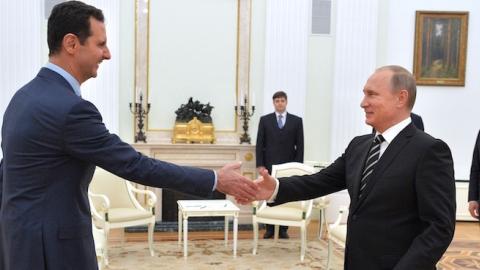Over the past several months, the Obama administration has taken a blinkered view toward the conflict in Syria--with grim consequences for America's position in the Middle East. In a burst of activity and statements, Secretary of State John Kerry has honed in on the death and destruction in Syria to prioritize a ceasefire above all else. This week, in the aftermath of the suspension of the Geneva talks, this effort has reached its apex. By elevating the humanitarian imperative, however, the Obama administration is subordinating the key to unlocking an enduring peace--the removal of Syrian dictator Bashar Assad.
In a December meeting in Moscow, Kerry conceded that he no longer deems regime change a necessary prerequisite to concluding the conflict, since the United States is "not seeking so-called regime change as it is known in Syria." Just this week, State Department spokesman John Kirby reiterated his boss's perspective, arguing that "being able to have talks ... you can start to get at the issues that are most -- of prime importance ... which is a ceasefire and humanitarian access."
Surely, after years of inaction, a sudden humanitarian awakening does not explain the American shift on the fate of Assad. Instead, the answer lies with Obama's aversion to the use of force and the rise of Islamic State. The spectacular attacks in Paris and San Bernardino roused the American public, gave new urgency to the campaign against ISIS, and forced Obama to revisit his claim that ISIS had been "contained." However, rather than oust Assad from power and eliminate Islamic State's primary recruitment tool--an undertaking antithetical to a president who campaigned on ending America's wars in the Middle East--Obama has turned to Russia and Iran in an attempt to end the civil war. Emboldened by the Iran nuclear deal, Obama hopes to thread the diplomatic needle once more.
Vladimir Putin has taken notice. His foreign minister, Sergey Lavrov, has repeatedly played into the Obama administration's biases by hinting at future cooperation in Syria, leading Obama to muse in July about "an opportunity to have a serious conversation" and to anticipate in December "a shift in calculation in the Russians." Those "opportunities" and "shifts" have proven totally illusory--instead, Russian fighter jets regularly and relentlessly pummel the positions of anti-Assad rebels while Iranian operatives direct the action below. Thus far, Obama's warning that Russia is going to get "stuck in a quagmire and it won't work" remains nothing more than a revealing solipsism. On the contrary, Assad is reestablishing his rule under Russian-Iranian protection across vast portions of Western Syria. These bloody facts on the ground have caused the U.S. to slide steadily toward Moscow on the question of Syria's political future, a capitulation we dress up as urgent humanitarianism. Now, the regime's most recent advances around Aleppo confirm that Assad wants more than a Damascus to Latakia corridor--indeed, he wants it all back. American concessions aimed at launching the political process have only fed Assad's desire for total victory.
The Obama administration's strategy of borrowing Russian and Iranian power is a fool's errand--it will only cede the Eastern Mediterranean to Moscow and Tehran, ensure Assad's permanent survival, and supercharge Islamic State and Hezbollah while eviscerating the moderate Sunni opposition.
A better approach would be to acknowledge that the Middle East is more like an interconnected system than a set of independent silos. The status of Assad is intertwined with that of ISIS, which feeds off Assad's butchery to recruit among Sunnis and find safe-haven. The road to beating back ISIS begins with supporting traditional allies like Turkey and Saudi Arabia against Russia and Iran in their demand that Assad must go. Only by removing Assad can we expect our traditional allies and the Sunnis of the northern Middle East to turn on ISIS. When Assad besieges rebel-held areas, the United States should airlift in supplies. When Kurdish factions do the bidding of Russia and Assad in northern Syria, we should push-back. And when Russia bullies the opposition in negotiations, we should stand with our friends.
All of this requires a renewed commitment to the traditional tools of statecraft. Obama has repeatedly invoked the specter of an Iraq-style intervention in justifying American aloofness toward Syria. At times, Obama has even defined avoiding conflict as a national security interest; increasingly, the administration is engaged in contortions to justify troop deployments to the region. As Putin has demonstrated, however, diplomacy is not simply ideational, but premised on hard facts on the ground--facts which he has altered with a relatively modest deployment of Russian troops. It's not too late for the United States, in coordination with our Sunni Arab allies and Turkey, to implement a no-fly zone and safe zones to give the moderate Sunni rebels and political opposition a springboard from which to rollback ISIS and defeat Assad. But time is of the essence--unless, that is, we are prepared to cede our decades-long leadership role in the region to Russia and Iran. That would be the greatest humanitarian catastrophe of all.
















